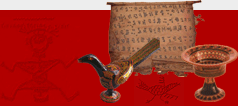|
文化翻译及对彝族宗教解析中的若干问题
Cultural Translation and Some Problems in the Interpretation
of Yi Religion
Hill, Ann Maxwell 马克安
Dept. of Anthropology, Dickinson College, USA
美国狄更生学院人类学系
【摘要】在最近一期人类学新闻上发表文章的多数作者都认为,人类学的文化翻译过程,绝不仅仅是把当地语言中所使用的词汇逐字翻成田野工作者的语言。不同的语言来自不同的社会环境,而民族志学家面临的任务就是从一个社会环境,“解析”或“翻译”到另一个社会环境,这个过程是阿萨德(Asad)(1993:171)称之为:“五十年代以来对社会人类学独特的工作所作的近乎陈腐描述”(1993:171)。就这两种翻译——逐字翻译和针对不同的社会环境所作的翻译而言,关键的是要在对当地文化范围的解释中根据上下文确定关键词汇的意义,而这往往存在于两种翻译之间。这三种类型的翻译都将在此讨论。最终的目的不仅仅跟彝族宗教有关,而是要确认对彝族宗教解析上的一些问题,而这些都跟中国民族学家和美国人类学家之间,在学术传统以及文化和语言实践等方面存在的差异有关。我将集中在现代中国和西方学术文化中所使用的有关宗教和迷信的广义概念以及对彝族宗教解析中要害的概念,如图腾,鬼,神。我将对彝族宗教的不同途径作历史的叙述,并指出对彝族宗教的解析,一直是随着历史条件的演变的,对彝族宗教作民族学和人类学的解析是当前正在进行的工作。我将根据在小凉山对诺苏人进行的采访和参与观所取得的数据,提出我的观点,并跟以往的著作作对比,用这对比来探索对彝族宗教不同的解析。
关键词: 文化翻译 中国民族学 美国人类学 学术传统 诺苏 图腾 鬼 神
Abstract
Most contributors to a recent series in Anthropology
News on translation agree that the process of cultural translation
in anthropology is much more than word-to-word glossing
of terms from indigenous languages into the language of
the fieldworker. Languages are embedded in social worlds,
and to the ethnographer is left the larger endeavor of interpreting,
or “translating” from one social world to another, a process
that Asad reminds us has “since the 1950s become an almost
banal description of the distinctive task of social anthropology”
(1993:171) Critical to both kinds of translation – word-to-word
and bridging different social worlds – but located somewhere
in between them is the task of contextualizing key terms
within explanations of indigenous cultural domains. All
three modes of translation are invoked in the discussion
here. The ultimate goal is not a definitive treatment of
Yi religion, but rather to identify some problematic interpretations
of Yi religion that are related to differences between Chinese
ethnologists and U.S. anthropologists in the realms of scholarly
conventions, cultural and linguistic practices and so forth.
I focus in particular on broad notions of religion and superstition
in modern Chinese and Western academic cultures, as well
as on such concepts as “totems,” “ghosts” and “spirits”
that have been mainstays in the interpretation of Yi religion.
I historicize some of the approaches to the study of Yi
religion, pointing out that interpretations of Yi religion
have been responsive to changing historical circumstances
and coincidentally making the case that ethnographic interpretation
of Yi religion is a work-in-progress. Using data from recent
fieldwork, including interviews and participant observation
with Nuosu in Xiao Liangshan, I discuss my findings and
juxtapose them to earlier work, using these comparisons
to explore alternative interpretations of Yi religion.
Keywords: cultural translation─Chinese ethnology─U.S.
anthropology─scholarly conventions─ Nuosu─totems─ghosts─spirits
作者简介:
马克安,女,美国人,狄更生学院人类学系教授,系主任,代表作是《商人与移民:东南亚的族群与云南华人》 (Merchants
and Migrants: Ethnicity and Trade Among Yunnanese Chinese
in Southeast Asia, 1998) ,《中国的语言问题:人类学附记》(Language Matters
in China: Anthropological Postscript),1990年起转而专门研究云南小凉山彝族,发表了一系列论文和田野研究报告。主要研究方向为小凉山彝族社会,包括过去的奴隶制度、民间纠纷和宗教。
About the Author:
Ann Maxwell Hill teaches anthropology at Dickinson College
in Carlisle, Pennsylvania, U.S.A. Her research has been
broadly focused on Xiao Liangshan Yi society, including
topics such as the slave system, feuding, and religion.
|





